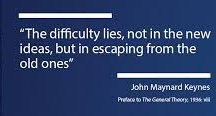From Asad Zaman The first post on Reading Keynes provided an outline of the reasons why this is a good idea. It is clear that economics is broken. We need a new macroeconomics for the 21st century, one which can solve the massive problems which humanity as a whole is facing on political, social, economic, and environmental dimensions. Keynes faced similar problems, and found solutions which guided economic policy in the mid twentieth century. It is always useful to absorb the insights of our predecessors, before trying to build upon them. Such a methodology is essential for the advancement, progress and accumulation of knowledge. Our current stock of human knowledge is based on the collected insights and labors of hundreds of thousands of scholars, accumulated over the centuries. We would return to the stone ages if we were to reject it as being full of contradictions and errors (which it is). Instead, progress occurs by absorbing the past accumulated wisdom, and trying to remove the errors, or add missing insights, building on our heritage, rather than discarding it and starting over from scratch. Several of the central Keynesian insights into the causes of the Great Depression never made it into the economics textbooks. However, our goal in studying Keynes goes far beyond just the re-discovery of these lost Keynesian insights.
Topics:
Editor considers the following as important: Uncategorized
This could be interesting, too:
tom writes The Ukraine war and Europe’s deepening march of folly
Stavros Mavroudeas writes CfP of Marxist Macroeconomic Modelling workgroup – 18th WAPE Forum, Istanbul August 6-8, 2025
Lars Pålsson Syll writes The pretence-of-knowledge syndrome
Dean Baker writes Crypto and Donald Trump’s strategic baseball card reserve
from Asad Zaman
 The first post on Reading Keynes provided an outline of the reasons why this is a good idea. It is clear that economics is broken. We need a new macroeconomics for the 21st century, one which can solve the massive problems which humanity as a whole is facing on political, social, economic, and environmental dimensions. Keynes faced similar problems, and found solutions which guided economic policy in the mid twentieth century. It is always useful to absorb the insights of our predecessors, before trying to build upon them. Such a methodology is essential for the advancement, progress and accumulation of knowledge. Our current stock of human knowledge is based on the collected insights and labors of hundreds of thousands of scholars, accumulated over the centuries. We would return to the stone ages if we were to reject it as being full of contradictions and errors (which it is). Instead, progress occurs by absorbing the past accumulated wisdom, and trying to remove the errors, or add missing insights, building on our heritage, rather than discarding it and starting over from scratch.
The first post on Reading Keynes provided an outline of the reasons why this is a good idea. It is clear that economics is broken. We need a new macroeconomics for the 21st century, one which can solve the massive problems which humanity as a whole is facing on political, social, economic, and environmental dimensions. Keynes faced similar problems, and found solutions which guided economic policy in the mid twentieth century. It is always useful to absorb the insights of our predecessors, before trying to build upon them. Such a methodology is essential for the advancement, progress and accumulation of knowledge. Our current stock of human knowledge is based on the collected insights and labors of hundreds of thousands of scholars, accumulated over the centuries. We would return to the stone ages if we were to reject it as being full of contradictions and errors (which it is). Instead, progress occurs by absorbing the past accumulated wisdom, and trying to remove the errors, or add missing insights, building on our heritage, rather than discarding it and starting over from scratch.
Several of the central Keynesian insights into the causes of the Great Depression never made it into the economics textbooks. However, our goal in studying Keynes goes far beyond just the re-discovery of these lost Keynesian insights. A central goal is to apply and illustrate a radically different methodology for studying economics in particular, and social science in general. This is derived from a study of The Methodology of Polanyi’s Great Transformation. This is an extremely important point, which we proceed to amplify and explain further. Read More
